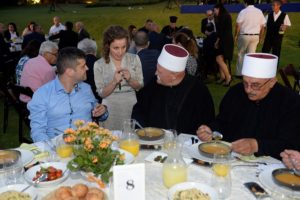 I can hear many of you asking, “What in the world is an iftar?” This Arabic word means “a meal that breaks the fast” that occurs after sunset each day during Ramadan, the Muslim month of fasting. Ramadan occurs in the ninth month of the Muslim calendar. Here you can see how Ramadan’s dates move from year to year, since the Muslim calendar is based on the moon and the Western (Julian) calendar is based on the sun.
I can hear many of you asking, “What in the world is an iftar?” This Arabic word means “a meal that breaks the fast” that occurs after sunset each day during Ramadan, the Muslim month of fasting. Ramadan occurs in the ninth month of the Muslim calendar. Here you can see how Ramadan’s dates move from year to year, since the Muslim calendar is based on the moon and the Western (Julian) calendar is based on the sun.
In 610 CE, Muhammad decreed fasting would take place in the ninth month. When he said fasting, he meant it. This includes, between sunrise and sunset: no smoking, no sex, no food, no liquids—not even water. Muslims go to work, school, and do all the necessary things to keep the home fires burning. Fasting, prayer, and discipline are the foundation stones of Islam. The entire community fasts, with exceptions made for sickness, age (very young and very old), pregnancy, breast-feeding, or life-threatening conditions.
I’ve had to ask myself, if I were a Muslim, would I fast? In some Muslim countries, not to fast is punishable by death. I strongly suspect that in those places I’d learn how to fast—very quickly. As a Christian, I have tried fasting, and I don’t do very well. I start to obsess about food, get a headache, chew lots of gum, and look at my watch every five minutes, hoping for the iftar.
A couple of times our family has been in a Muslim country during Ramadan. Whether one is a Muslim or not, one is very aware that it’s Ramadan because about 4:30 a.m. (the times change daily) all the mosques, with their loudspeakers at peak volume, announce sunrise and the start of the fast.
While there, we found a different travel issue: It’s almost impossible to find a restaurant open until the loudspeakers announce that it’s officially sunset and the iftar can begin. We discovered that people can be very clever in their “fasting.” Some folks party all night, stop five minutes before sunrise, and spend the day sleeping it off. Once the iftar is announced, they are out partying again. I don’t think that this is what Muhammad had in mind.
We have been tutoring in the jails here for years. A few years ago, I was assigned a Muslim student. As Ramadan approached, my student shared that he was going to observe this sacred time while in jail, which meant that he had to get up at 3:30 a.m. to eat a not-very-good sandwich. His “prayer rug” was a Ralph’s grocery bag. He used it five times a day, facing Mecca, for his self-imposed prayer time. Most staff and inmates had never seen this observance and thought he was crazy, banging his head against the floor in worship. Often, because there are so many official duties the jail staff must do, he never had his iftar until 10 p.m. I truly admired him and all other Muslims who observe the holy month. It has to be a challenge!
Every year my wife and I are invited to various iftars where we meet Jews, Muslims, Christians, LGBTQUI individuals, officers from different police departments, and people of all ages and stages. This year, we arrived about 6 p.m. and had an opportunity to mingle until 8 p.m. After the call to prayer, the iftar began. As is the custom, we all ate three dried dates and drank a thirst-quenching beverage while the women, all members of the Orange County American-Muslim Women’s Empowerment Council, brought out delicious Middle Eastern food. After the meal was over, we sat around the table chatting with our hosts.
This is how we can make peace in the world, by having more iftars, sharing our faith, getting to know our neighbors, and developing relationships built on trust and agape.
Which strategy do you think is more effective—travel bans on certain Muslim countries, or sharing iftars with our Islamic neighbors?
Photo courtesy of US Embassy Tel Aviv. CC by 2.0
Growing up, we had ‘iftar’ type meals every Sunday evening and Wednesday evening, where we usually brought guests. It sure worked then. Wonder about now.
It sounds like a great idea to me. The side benefit would be that if we fasted and prayed more, we would not get to be obese.
I like the idea of sharing meals with others and even sharing religious ceremonies that include fasting. If we all peacefully share religious rites and meals with each other and carry on polite conversations with each other, we would likely have a much more fulfilling and peaceful world.
However, as the weather has turned quite warm and as I thus drink lots of water during the day, I am not sure about going without fluids all day.